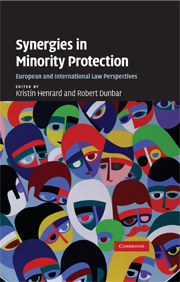Book contents
- Frontmatter
- Contents
- Foreword
- Abbreviations
- 1 Introduction
- PART A Minorities-specific instruments, provisions and institutions
- PART B Non-minorities-specific instruments, provisions and institutions
- 7 Developments relating to minorities in the law on genocide
- 8 The United Nations International Covenant on Economic, Social and Cultural Rights
- 9 The United Nations International Convention on the Elimination of All Forms of Racial Discrimination
- 10 The United Nations Convention on the Rights of the Child and Children Belonging to Minority Groups
- 11 UNESCO's Convention Against Discrimination in Education
- 12 A patchwork of ‘successful’ and ‘missed’ synergies in the jurisprudence of the ECHR
- 13 The many faces of minority policy in the European Union
- 14 Developments under the African Charter on Human and Peoples' Rights relevant to Minorities
- 15 Regional cooperation and minority issues in the Asia-Pacific region
- Index
- References
15 - Regional cooperation and minority issues in the Asia-Pacific region
from PART B - Non-minorities-specific instruments, provisions and institutions
Published online by Cambridge University Press: 21 July 2009
- Frontmatter
- Contents
- Foreword
- Abbreviations
- 1 Introduction
- PART A Minorities-specific instruments, provisions and institutions
- PART B Non-minorities-specific instruments, provisions and institutions
- 7 Developments relating to minorities in the law on genocide
- 8 The United Nations International Covenant on Economic, Social and Cultural Rights
- 9 The United Nations International Convention on the Elimination of All Forms of Racial Discrimination
- 10 The United Nations Convention on the Rights of the Child and Children Belonging to Minority Groups
- 11 UNESCO's Convention Against Discrimination in Education
- 12 A patchwork of ‘successful’ and ‘missed’ synergies in the jurisprudence of the ECHR
- 13 The many faces of minority policy in the European Union
- 14 Developments under the African Charter on Human and Peoples' Rights relevant to Minorities
- 15 Regional cooperation and minority issues in the Asia-Pacific region
- Index
- References
Summary
Introduction
Asia-Pacific is among the most diverse regions of the world. In Papua New Guinea, the population of 4 million use some 700 languages, and some countries officially recognise more than fifty minority groups within their territory, including in the People's Republic of China and Vietnam. Successful practices in the region exist with measures at the national and sub-national levels to protect human rights, including minority rights, of persons belonging to minorities. That policies on minority issues have affected social and political stability is noted in several regions in Indonesia (West Papua, West and Central Kalimantan, Sulawesi and the Malukas), in Myanmar (especially involving the Karen and Shan minorities), in the Mindanao region in the Philippines, and by flows to Cambodia of persons belonging to indigenous groups from the Central Highlands of Vietnam. Other examples include social unrest in the south of Thailand, ethnic tensions in Fiji and the Solomon Islands, and situations in the People's Republic of China (e.g. the Uighurs in Xinjiang). The associated challenges of integrating diversity in states in the Asia-Pacific have to date not resulted in effective sub-regional instruments and institutions tasked to multilaterally address, monitor and assist on minority issues; there are no regional human rights or conflict-prevention mechanisms similar to those established in Africa, the Americas and Europe. However, while less prone to liberal institutionalism, there are indications of emerging sub-regional normative and procedural frameworks in the Asia-Pacific.
- Type
- Chapter
- Information
- Synergies in Minority ProtectionEuropean and International Law Perspectives, pp. 401 - 424Publisher: Cambridge University PressPrint publication year: 2009



